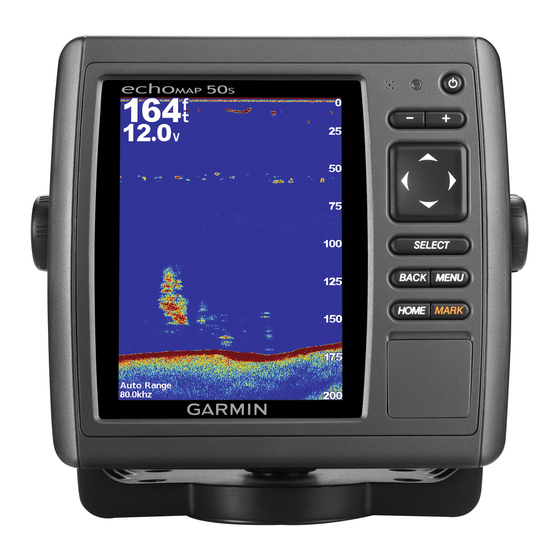Installing a Transducer
Consult the chartplotter feature matrix on
installation procedures are only applicable to sonar-capable chartplotters.
NOTE: The following procedures contain installation instructions for the transducer included with the "s" model GPSMAP 400/500 series
chartplotters. If you choose to use a different transducer, installation instructions are provided in the transducer kits. Some transducers might
have to be installed by a professional marine installer.
Proper transducer installation is key to getting the best performance from your sonar-capable chartplotter. Be sure you have the following
components in the transducer package, as well as the following tools:
Transducer Package
• Transom-mount transducer (not pictured)
A – 5 mm flat washers (2)
B – 5 × 30 mm screws (2)
C – 10-32 lock nut (1)
D – 4 × 12 mm screw (4)
E – 10-32 × 1.75 in. screw (1)
F –
/
in. cable clamps (2)
1
4
G – Plastic spacer (1)
H –
/
in. rubber washer (1)
1
4
I – Cable tie, 5.6 in. (4)
J – Cable entry cover (1)
NotIce: Do not cut the transducer lead or any part of the transducer cable. Cutting the transducer cable voids your warranty. The cable cannot be
spliced and connected to any existing (Garmin or non-Garmin) transducer cables. If the transducer lead is too short, extension cables are available from
your Garmin dealer.
Assembling the Transducer
1. Insert the rubber washer (H) and the plastic spacer (G) into the transducer
at the same time. DO NOT lubricate the rubber washer.
2. Route the power/data cable toward the back of the transducer. Slide the
transducer into the transducer mount.
3. Place a 5 mm flat washer (A) on the 10-32 × 1.75 in. screw (E), and insert
the screw through the transducer mount, the spacer, and the rubber
washer.
4. Place the remaining 5 mm flat washer (A) on the exposed end of the 10-32
× 1.75 in. screw. Install the 10-32 locknut (C) finger tight. Retighten the
transducer after installation on the boat.
Mounting the Transducer on a Transom
When selecting a transom-mount location, consider the following for optimal performance:
•
For your sonar to operate properly, the transducer must be located in calm water.
•
Mount the transducer as close to the center of the boat as possible.
•
Do not mount the transducer in locations where it might be jarred when launching, hauling, or storing.
•
Do not mount the transducer in the path of the propeller on single-drive boats. The transducer can cause cavitation that can degrade the
performance of the boat and damage the propeller. On twin-drive boats, mount the transducer between the drives, if possible.
Note: Do not mount the transducer behind strakes, struts, fittings, water intake or discharge ports, or anything that creates air bubbles or
causes the water to become turbulent. The transducer must be in clean (non-turbulent) water for optimal performance.
GPSMAP 400/500 Series Installation Instructions
page 1
to determine if your chartplotter is capable of using sonar. The following transducer
A
E
B
C
F
D
J
Tools Needed
• Drill and drill bits
•
/
in. (9.5 mm) wrench or socket
G
3
8
• Masking tape
• Number 2 Phillips screwdriver
• Marine sealant
H
I
C
C
E
E
A
A
G
G
H
H
Back of the transducer
Back of the transducer
Cable tie slot
Cable tie slot

